If you’re joining us just now, follow the snake’s tail to the Prologue or climb a ladder to the Table of Contents.
Chapter 12: “It’s Not My Fault That You’re Like This”
It was Halloween night and Evan stood in a cornfield somewhere in Nebraska. Everything was black-and-white and smelled colloidal because he was trapped in a film negative. Since he was two-dimensional, two children ran past him. They were terrified because something wasn’t right about the haunted corn maze. They paid him no regard as they vanished into the white darkness of the negative.
He knew he was a detective and that Niyati, who was an award-winning forensic photographer whose work had been showcased in art galleries throughout the world, was his partner. Since Niyati worked with film, Evan assumed she had something to do with his current predicament.
At first he thought the filmy residue on his fingers and palms was the soap he’d washed his hands with at the morgue, but it turned out to be a wad of 35mm film strips, which he let fall to the ground. The film strips turned into white snakes because their scales were black; they slithered off into the corn rows. Bamboo ladders rose up out of the cornfield. And the height of the ladders and the height of the corn kept shifting.
“A maize maze,” Evan said nervously. “Amaze.” He felt the onset of a panic attack, because his character in the police procedural he starred in, which was also America’s favorite sitcom, had suffered trauma as a child, and, as a result (and to the amusement of the canned laughter), Evan’s character always passed out at the sight of blood; but it was the blood’s redness that made him queasy, so he assumed the white blood in the film negatives wouldn’t affect him.
“Niyati?” he said in an urgent whisper. There was no response.
He saw a husky shaman with a staff standing in front of him and was relieved.
“Gordon!” he cried out.
A flash, a pop, an electronic sreeeeeen— and Evan was transferred into the next scene.
“A rhymed couplet often closes the first act of a play,” Niyati said.
Evan was in his office at FBI headquarters in downtown Chicago; and he suddenly realized that it hadn’t been a shaman with a staff that he’d seen standing in the cornfield, but a scarecrow on a pole holding a broom. And this was because Gordon was a serial killer who erected scarecrows over the shallow graves of his victims.
“You have to visit him today,” Niyati said.
The camera flashed twice more, but Niyati wasn’t taking pictures. She was standing at the window of Evan’s office, waiting for him to say something, to acknowledge that he was partially responsible for what had happened.
It was raining outside; and sometimes it rained inside the office. The water trickled down Evan’s trench coat.
“Gordon could never have done these things,” he said.
There were pictures pinned to the cork-board of the office. The photographs surrounded an inked-up map of the Midwest. Yarn connected the photographs to the map.
The Bureau had sent Niyati to that shabby roadside motel outside Omaha where Gordon had been apprehended. She had photographed the west wall of Gordon’s motel room because on this wall Gordon had tacked up photographs of the places throughout the Midwest where he’d kidnapped his victims and where he buried their bodies.
The photographs in the motel had been connected by yarn to an inked-up map of the Midwest on the motel’s west wall. Gordon had not only taken the pictures on the wall, but had taken the forensic photographs Niyati had made as well, because before he became a serial killer, Gordon had been an award-winning forensic photographer whose work had been showcased in art galleries throughout the world.
It was these photographs that Evan now studied on the cork-board around the map of the Midwest in his depressing FBI office in downtown Chicago somewhere on the Astral Plane.
“The man you’re telling me I have to see,” Evan said, “is not Gordon. . . You forget—I saw Gordon’s past projected into my mind on the desert planet of Satcitananda. This isn’t the man I know.”
“Are you sure of that?” Niyati asked—and the canned laughter laughed.
Evan went to a window that was no longer there and pondered the storm-clouds over Chicago. And the raindrops that fell outside his office and the raindrops that fell inside his office were the tears of Gordon, who was staring out of the barred window of his cell at a bright sunny day four decades ago when his kindergarten classmates wore birthday hats and told him to blow out the candles; and dad wore a fake Mephistophelean beard and amused the kiddos by doing magic tricks, because his dad had been a great guy when he was sober.
And now Gordon (in his cell) and Evan (in his office) simultaneously said, “I don’t know why I’m here.”
And the canned laughter laughed as Evan took his seat across from Gordon in the prison’s rec room, which happened to be that retro diner across the street from Caltech (on the Astral Plane) where they’d started their adventure.
Evan looked suspiciously at Gordon. “You’re a demon wearing the likeness of my friend.”
Gordon smiled.
Niyati stood by the formica counter, arms folded. She couldn’t interrupt them. The Havasupai man had directed her not to intervene. And since the Havasupai man was the Lord and Master of all dreamers who transit the Astral Plane, his word, which was actually the Word (with a capital “W”), was law.
“We must be inside one of the unborn universes,” Evan said. “And that means none of this is real.” He looked down at the sugar dispenser with its very real stainless-steel flap.
“Maybe, you’re right,” Gordon remarked. “But the real Gordon thought of doing those things.—And it was all he could do to keep from doing them.” Gordon’s smile vanished and he stirred the auburn-black coffee in his mug.
“Jesus Christ, Gordon! We’ve all had dark thoughts. We just don’t act on them.” And Evan remembered the beginning of his katabasis when he’d found himself in the boiling cauldron of his Id. He had felt a dark urge to fuck Niyati and tear her limb from limb.
“Do you really think this is about me?” Gordon asked.
“Well, it sure as hell ain’t about me,” Evan said. “It’s not my fault you’re like this in this alternate reality.”
“When I died, you didn’t even know what happened to me. You never bothered to find out. You just went about your life as if you’d never known me.”
“I don’t get why you’re bringing that up. The reason I’m in this katabasis is to learn from my mistakes, to set things right. And when I get back home, I won’t let you die. Simple as that.”
“It wasn’t just the fact that you never knew what happened to me after I died. It’s the fact you never were interested in what had happened to me before I died.” And now they both saw how Gordon had suffered, how he’d been abused as a child.
But Evan lost interest and thought the coffee tasted bitter even though he hadn’t yet raised it to his lips. He reached for the sugar dispenser but it was gone, which meant none of this was real and he was dreaming.
“The Gordon I knew would not have let the monsters who abused him make him into a monster too. He had courage, you don’t. That’s how I know you’re not real.”
“You’re self-centered.”
“I’m a good person. And I don’t have to listen to this bullshit anymore.” Evan pushed the coffee away and rose from the table.
“Visiting time’s over,” the guard said as the cell door slammed shut. The red light came on over the exit to the cellblock. The harsh buzzer rang out.
Evan walked with Niyati toward the exit.
“Evan!” Gordon cried out.
“Come on,” Evan said to Niyati, refusing to look back at the unreal Gordon in the prison cell.
“You’ll never win the game, Evan!. . . Not until you learn to show a little more compassion—a little more interest in the suffering of others!”
Evan was still in Chicago and it was gray outside. But now he stood in a large glass-walled butterfly house built into his red-brick mansion. It was 1881 and he was the spoiled son of a steel magnate. He had become an amateur lepidopterist to while away the idle hours.
He had discovered a new species of moth. The specimen fluttered under the bell-jar on the raised desk in the middle of the room. Evan went to the desk and removed the moth from under the glass.
“I shall call you plutella levitica,” Evan said, “in memory of my dear friend, Levi.”
Gently he positioned the insect on its back against the white matting of the spreading board. Then he pressed one finger on the moth’s thorax before driving the pin into it. The wings fluttered and the spirit of Levi, which stood in the green mist among the butterflies and moths, hung its head in grief and shame.
“Why not a butterfly?” a voice of glass asked. The voice was strained, piercing and literally vitreous, since Marcus, who was the speaker, was passing through the glass wall. Once inside, Marcus looked around at the butterflies. Then he looked at the shade of Levi and his eyes brimmed with tears.
“He was beautiful,” Marcus said. “He was like a butterfly.”
“Levi was drawn to the light, like a moth,” Evan replied insouciantly. “That’s why I named a moth after him.”
Marcus detected a hint of irony in Evan’s voice.
“You never knew he died,” Marcus said. “You never bothered to check up on him. You never cared.”
“I know, Marcus. . . But I’m a changed man now. The katabasis has taught me what I must do to correct the mistakes I have made, and to prevent any future mistakes that I might make from happening.”
“Evan, stop talking like a fuckin’ PBS miniseries. You didn’t like the fact that Levi was gay. And you never knew I was. . . But to be fair, I didn’t know myself.”
Niyati opened the door that connected the butterfly house to the mansion.
“Evan?” she said.
“My dear,” Evan replied without turning around, “will you please withdraw and give us privacy? We are discussing matters that are inappropriate for a person of your sex.”
Niyati closed the door delicately. Then she opened it again and slammed it to let Evan know that she didn’t think much of his current incarnation.
When Evan was certain Niyati was no longer listening, he wheeled around and confronted Marcus: “Fuck you, man! Sure, I didn’t really like Levi before I came to the Astral Plane, but now I know he’s a good guy. And I really do feel bad for what happened to him. But to be fair—to me, Levi used to creep me out because of the way he’d stare at me. But it’s fine. I just didn’t get the whole gay thing at the time, but now I do. I really like him. But just as a friend. You know? I could never be that kind of friend.”
“See, Evan. You’ve brought it all back to you. That’s the problem. You’re sad for Levi, but you’re sad for the Levi ‘drawn to the light’ that you’ve created in your head. You’re sweeping the rest of him under the rug. But the ‘gay thing’ (as you call it) was what drove him to kill himself. He didn’t have anyone to talk to about it. And he was scared to mention it to you because he knew you’d go ape shit.”
“He could’ve talked to his family about it,” Evan said. Then he turned away from Marcus, because he knew that that wasn’t true.
“Deep down you think Levi chose to be the way he is.”
Evan looked coldly at Marcus. “I don’t get why it’s suddenly my fuckin’ fault that everyone else is the way they are in these different versions of the planet Earth that I keep getting thrown into. I told you I’m fine with Levi being the way he is. You guys do whatever makes you happy.”
“I never was able to become close enough to him to become his friend. So I never knew what happened to him either. I lived another fifty-seven years after Levi died. I got married. . . to a woman. She was a great person. We had three kids, eight grand-babies. All of them beautiful.”
The corner of Evan’s lip curled. “See, Marcus? Who’s selfish now? You’re basically saying that the life you ended up with was fine and all, but you’d have thrown it all away to play house with my roommate. What about the three kids and eight grand-babies you loved so much?”
A tear rolled down Marcus’s cheek. “God, you’ve got a wicked streak to you.”
“I’m sorry,” Evan said. “I just can’t understand the lure of that lifestyle. It’s like two spark plugs without a socket.” The canned laughter laughed.
“I’ve been around you when you crack jokes like that about gay people. It’s not cool.”
“Oh my God,” Evan groaned, “this is fucking exhausting. I’m soooo sorry I told gay jokes.—Okay? I didn’t even know you were gay, Marcus. You don’t act like it.”
“It’s not just gay jokes, Evan,” Marcus said. “Remember when that asshole told that racist joke at the house party last March?!”
“Dude, the only reason I laughed at that joke was because you laughed at it too!”
“The only reason I laughed at that joke was because I was incredulous that he said it in the first place!”
“When I’m awake,” Evan said, “I don’t even know what incredulous means.”
“Me either,” Marcus said, “but it seemed like the right word to use.”
The two friends regarded each other with their hands on their hips.
“Evan, will you at least promise when you go back—to the real world—that you’ll try to make Levi feel like he can talk to you about the way he is, about what he’s feeling?”
“Yes,” Evan said.
“Really?”
“Yep.”
“Okay, show me. Let’s pretend I’m Levi and you’re back at UCLA. What’re you gonna say?”
Evan rolled his eyes. “Levi.”
“Yes?” Marcus said.
“I really like you as a friend.”
“Thank you, Evan. You mean a lot to me.”
“I know.”
Marcus frowned. Evan shrugged.
“I have a secret,” Marcus continued, “that I’ve never been able to share with anyone.”
“Dude, it’s cool. I know you’re into cock. I just don’t wanna hear about it.”
“Evan!”
“I’m done, Marcus!”
“Gordon was right!” Marcus shouted as Evan walked briskly to the door. “You won’t win the game unless you learn to show some compassion and interest in the suffering of others!”
Evan opened the door that connected the butterfly house to the anthropological museum built into Shiva Hall, his opulent manor house in the Cotswolds where he and Niyati lived. Evan was a squire and devout member of the Church of England (capital “C” of capital “E”); and lepidopterology was only one of his many hobbies.
He had recently published a blistering rebuttal to Charles Darwin’s The Descent of Man, and Selection in Relation to Sex, and he had separately urged the publishers to remove the obscene word “sex” from the book’s title: “Are the chaste eyes of our wives and daughters to be grossly violated from the book stalls of Holywell Street? Better the smut were jacketed yellow and hawked at Paddington Station.”
Evan thought about Marcus’s claim that Levi was a homosexual by nature and not by choice.
“Evan?” Niyati asked. “What did Marcus want?”
“Nothing of consequence,” Evan said. He kissed her on the brow.
They walked arm-in-arm through the anthropological wing of Shiva Hall past the exhibits of the primates from the Canadian Colony of Norway. It was a taxidermist’s nightmare. The apes were arranged in unnatural poses with multiple arms and legs affixed to the torsos in unseemly and inappropriate ways. Levi’s bleached skull surmounted a Cro-Magnon man’s spinal cord.
“Did you ever notice,” Evan said, “that the name Levi is an anagram for ‘Evil’.”
“Evan, that’s sacrilegious,” Niyati said. “Levi is a Biblical name.”
They moved in silence to the front door and exited the manor house.
Niyati looked up at him. “You’re vexed about something. Tell me what ails you?”
“What ails me?” Evan said, grinning, because now that he had exited Shiva Hall, he no longer sounded like an American actor trying to pass himself off as a Brit. “What’s bothering me,” he said, “is that I met a version of Gordon earlier today—in a universe that doesn’t exist—who told me that he could have become evil but chose not to. Then I meet Marcus in a butterfly house, who tells me Levi didn’t choose to become evil but was evil by nature.”
“Evan!” Niyati said. “Marcus never said Levi was evil. Why would you say such a cruel thing about your friend?”
Thousands of fireflies filled the purple twilight, mingling with the unborn universes that rose up from the lawn. A hedge maze surrounded the manor house and extended as far as the eye could see in every direction.
Evan and Niyati entered the maze but their way was barred.
“We can’t go this way,” Evan said.
“But we’ve already crossed over,” Niyati noted. They stood on the other side of the hedge wall.
A profound peace settled upon them.
Niyati took Evan’s hands into hers. “This is what the ancients would have called a locus amoenus,” she said, “which is to say a pleasant place—a kindly place.”
Evan closed his eyes and inhaled the scent of lavender. There were purple butterflies and moths all around them. The air was fresh and cool.
“Where are we?” he asked.
Niyati lowered her eyes. “We are in Hell.”
“Oh God,” Evan said, covering his face and weeping. “Why is it so beautiful?”






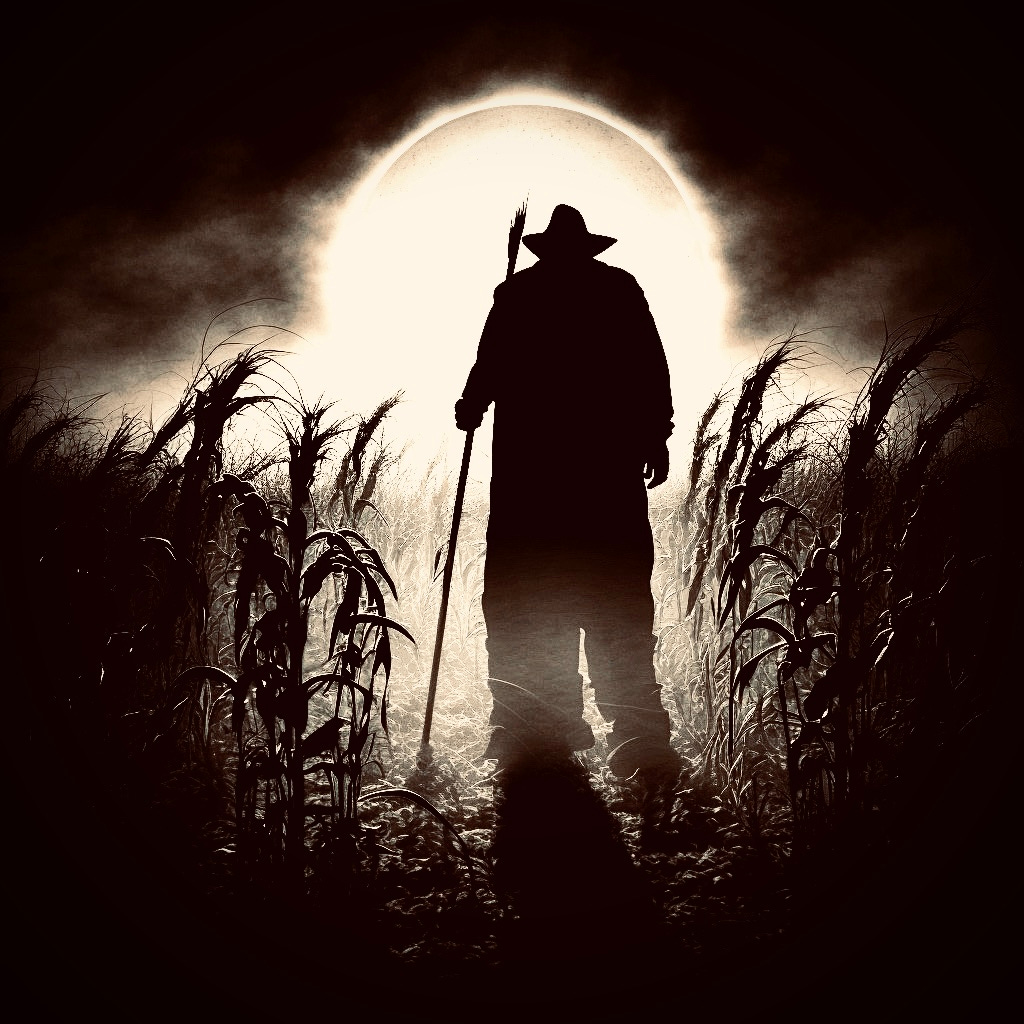


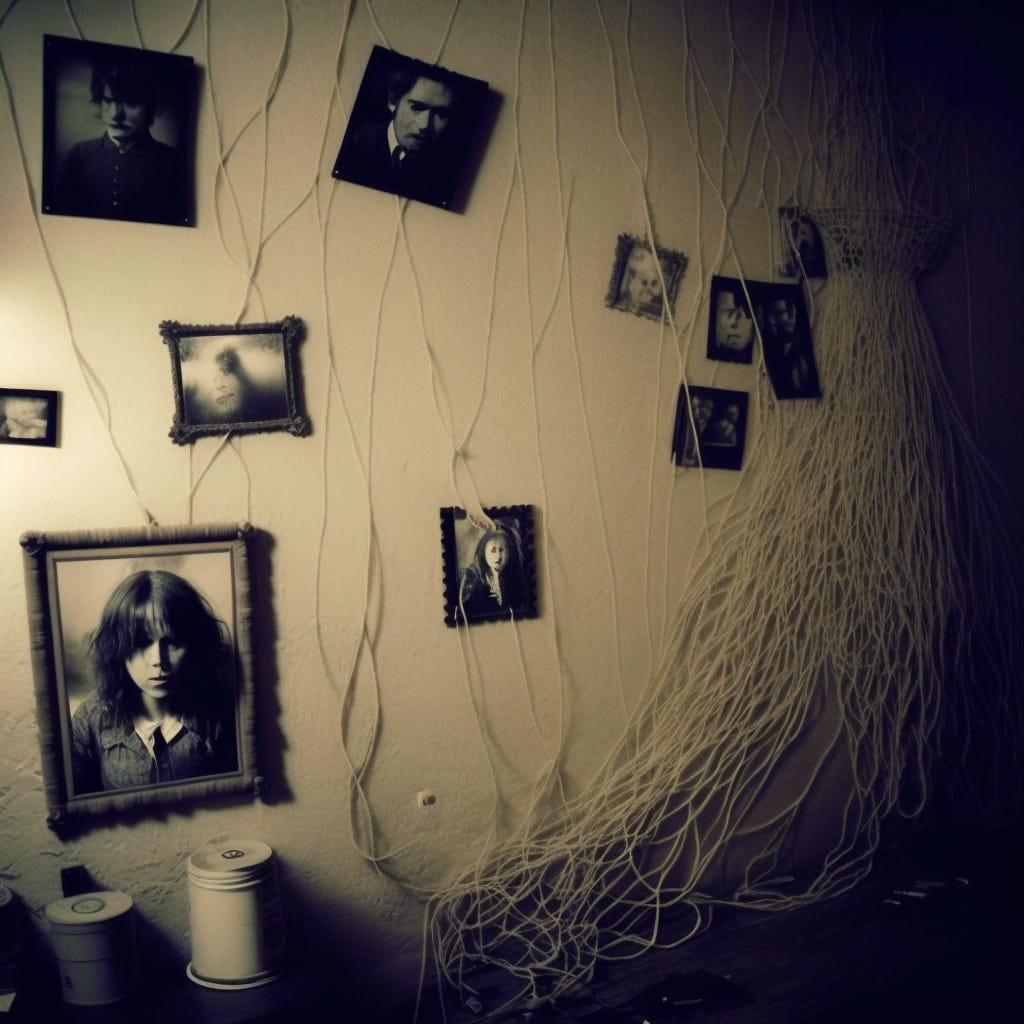

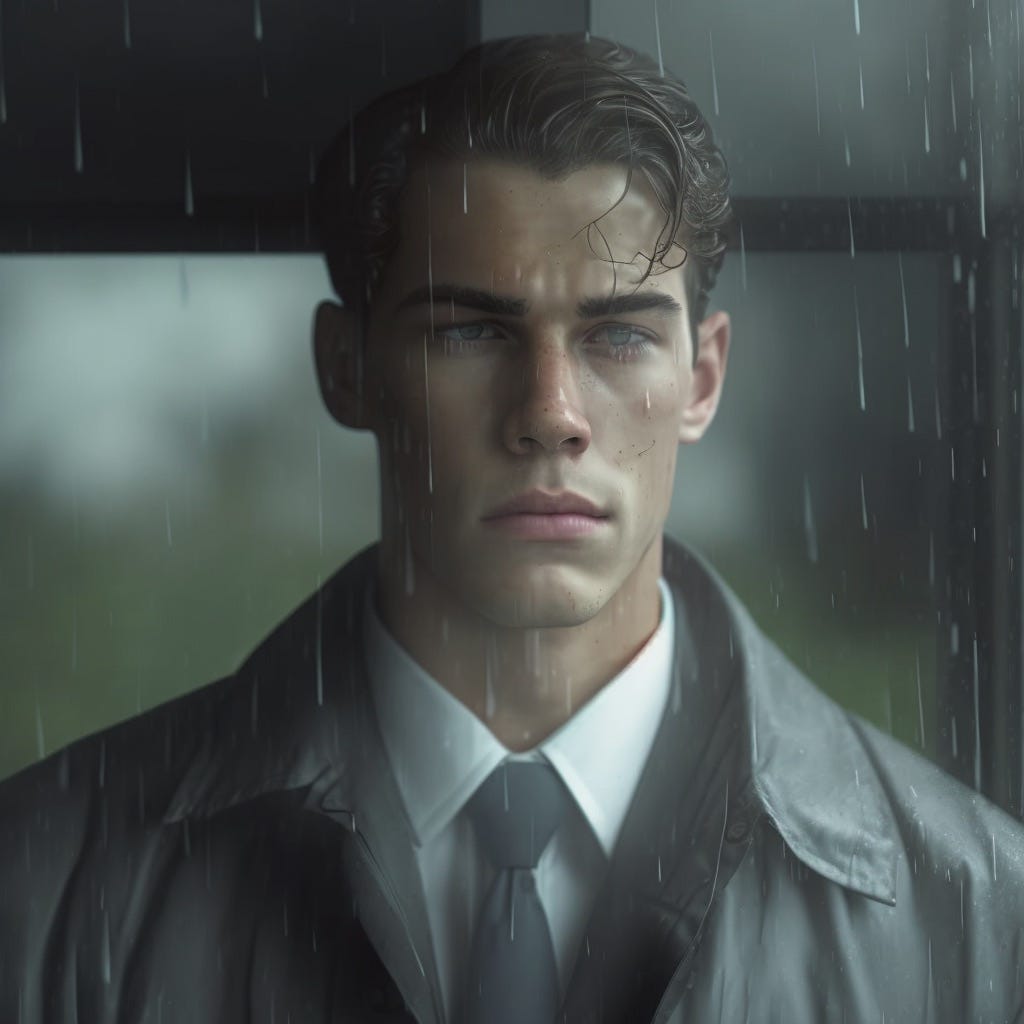




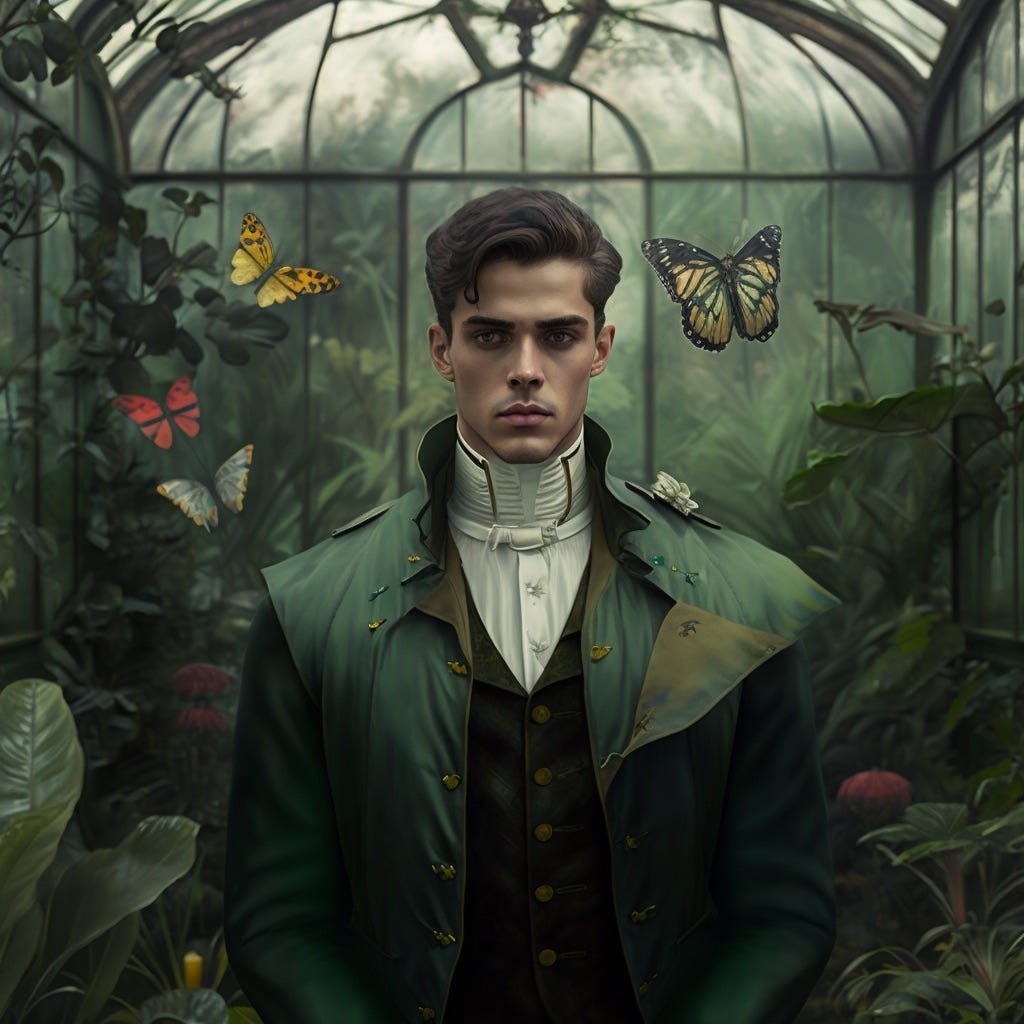

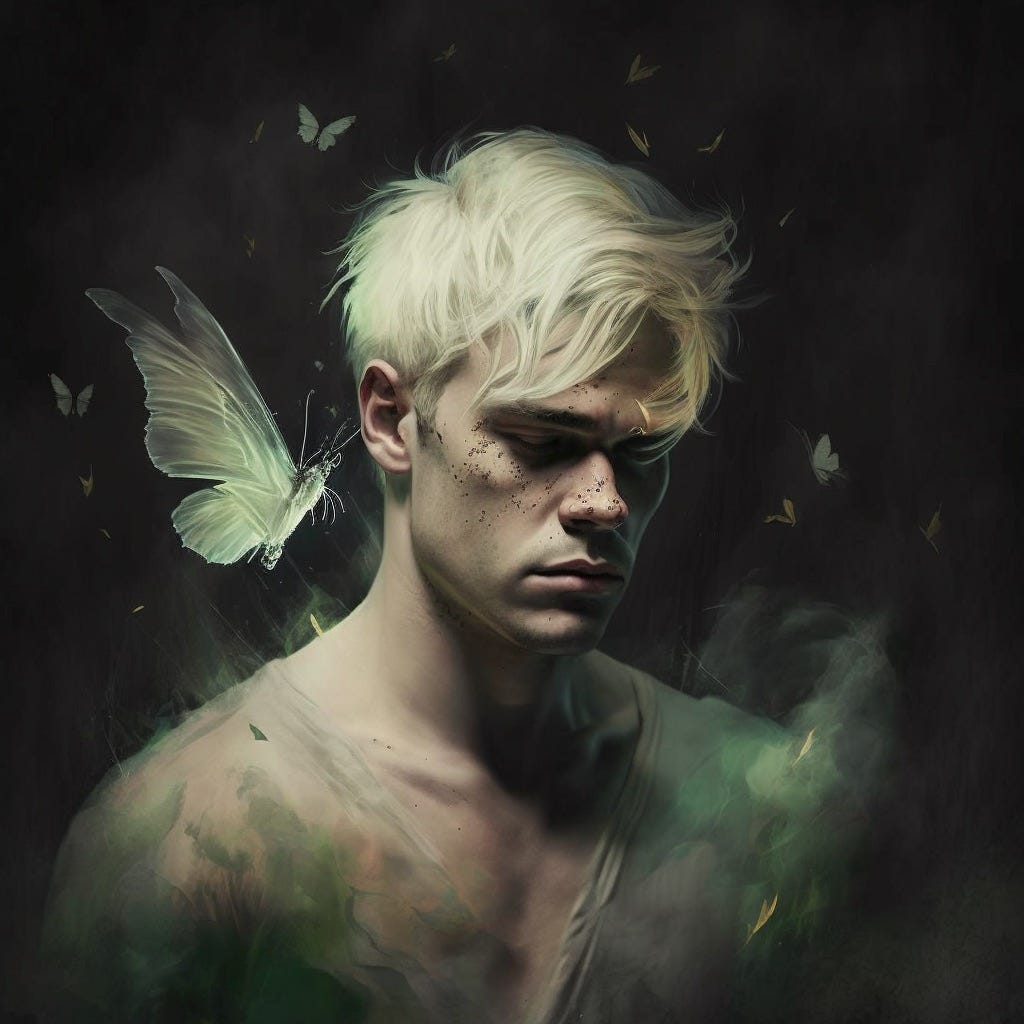

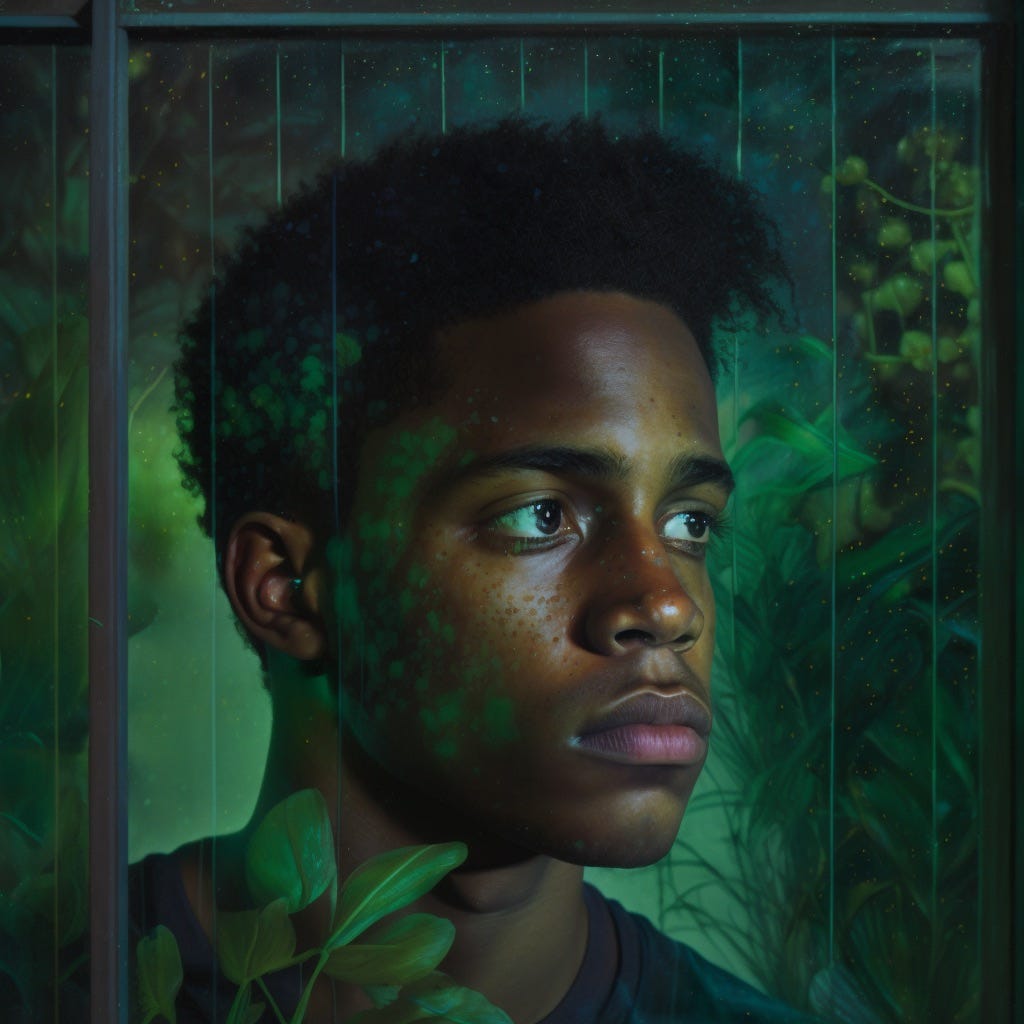


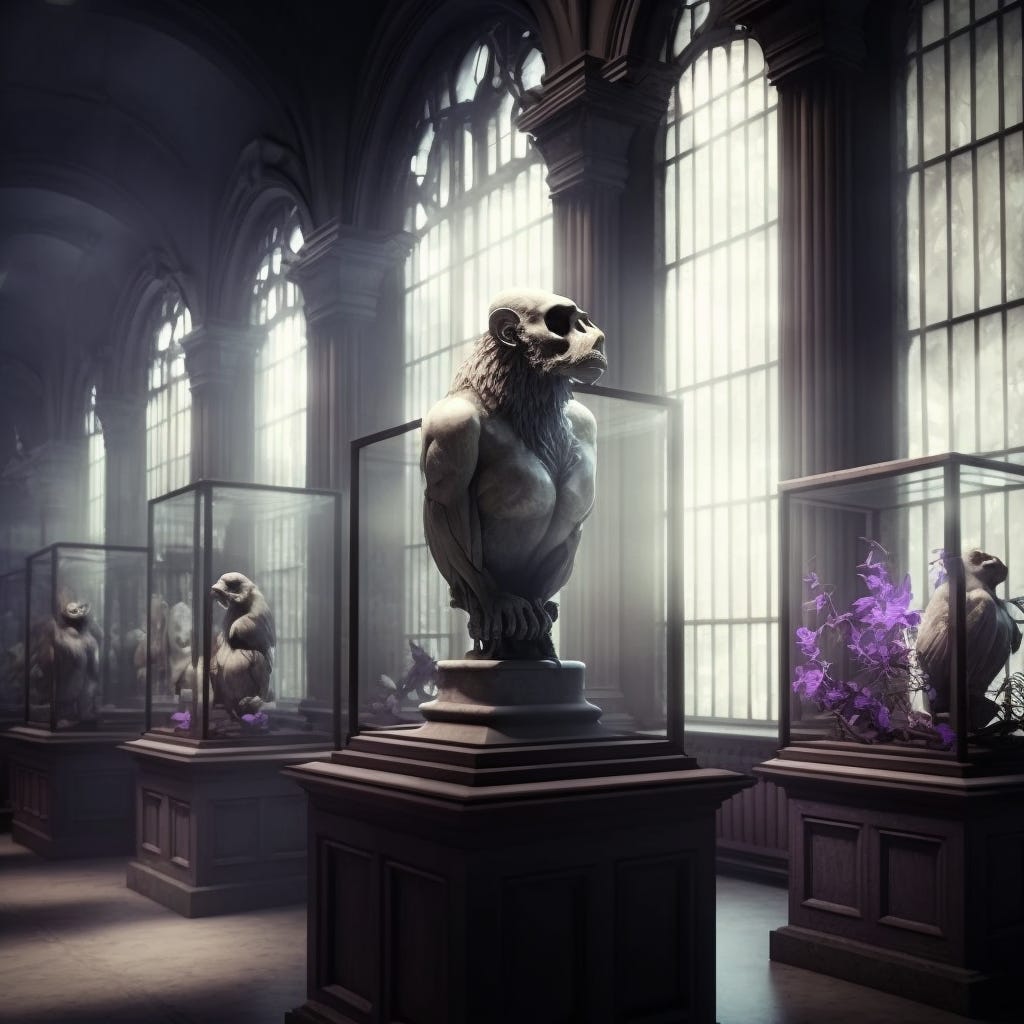
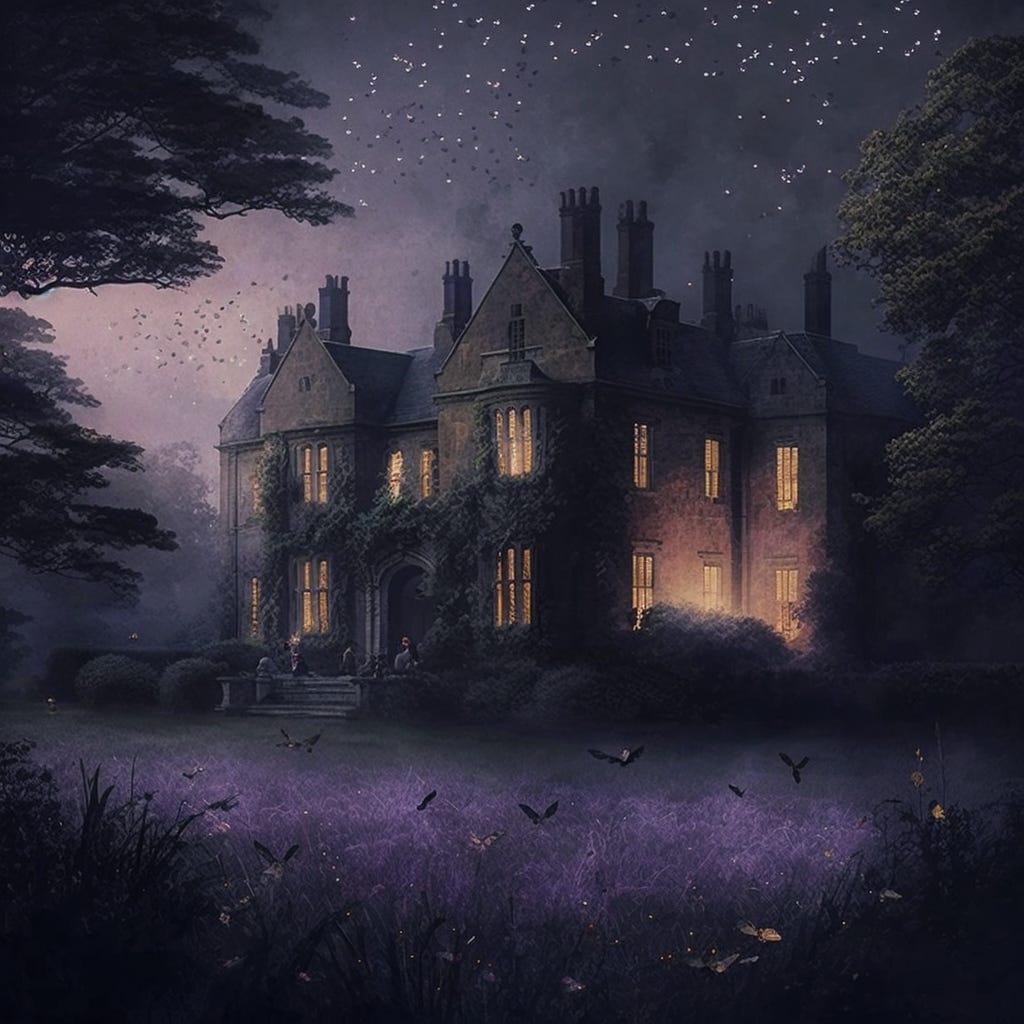


So much to chew on here. “You won’t win the game unless you learn to show some compassion and interest in the suffering of others!” So true. We can't really have compassion for others until we can recognize their suffering as our own. It's often a failure of imagination.